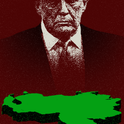The attack on the Chechen parliament by militants today is a serious incident that ought to be deplored. For the Russian president, however, the most powerful message may be one of restraint.
A glance at the history between Moscow and the troubled republic of Chechnya paints a stark picture of the chaos that could have ensued in the aftermath of the collapse of the Soviet Union. In the scale of the brutality and the human costs, on both sides, Chechnya stands out as the exception to an otherwise remarkably orderly break-up of the Soviet bloc. But the case of Chechnya also offers a lesson in the dangers of confronting nationalism with brute force.
There can be little doubt that the appointment of Chechnya's president, Ramzan Kadyrov, a Muslim whose father fought against Russian forces in the first Chechen war before defecting during the 1999 conflict, has led to a reduction in violence in the republic since he took office in 2007. But success has come at a cost.
Prominent critics, such as the journalist Anna Politkovskaya and human rights activist Natalia Estemirova, have accused Kadyrov and the Chechen government of attacking not just militants but all opponents of the regime. It is alleged that state forces have been behind the disappearances and torture of numerous people suspected of challenging the government. Politkovskaya was assassinated at her Moscow apartment in October 2006, while in July 2009 Estemirova was found dead from gunshot wounds to the head.
Even before he took the role of president Kadyrov was known as “the most powerful man in Chechnya” and headed a large private army known as the Kadyrovtsy. He has taken a consistently tough line with rebels and squeezed violence out of Chechnya’s borders, all the while carefully fostering his strongman image—keeping tiger cubs as pets, for instance.
The Kremlin appears to be following a similar strategy to that employed by Nato forces in Afghanistan, pumping huge amounts of money into the local economy while training and equipping a pro-Moscow government to resist local rebel forces. While there have been some considerable successes in improving the daily lives of Chechens, the bombing of the Moscow metro in March this year gave concrete proof that the “jihad” declared by the rebels is far from over.
After the attack Medvedev gave a talk to a group of human rights activists declaring:
“This is a double-pronged task. It is very difficult to create proper, modern conditions for education and business and to destroy the corruption and clannish nepotism that has formed in the Caucasus over the centuries.”
If he is to fulfil these aims Medvedev might want to give the comparison with Afghanistan further attention. Under Hamid Karzai’s government there is a growing consensus that negotiation with the Taliban may be the only strategy that will have any hope of ensuring a lasting peace for the Afghan people. The suggestion has won support from some unlikely corners, most notably General Stanley McChrystal who headed America’s mission in the country until June this year.
Any belief that Kadyrov’s iron grip on power might succeed in bringing the Islamist rebels to heel across the region is gradually being eroded with each new act of violence. His hard-line policies have made a mediated solution seem inconceivable and up till now his apparent success on the ground has prevented Moscow from pushing for such a strategy. With the conflict in Chechnya about to reach its 16th anniversary this December, it is surely time to reappraise the situation.
Moscow needs a new strategy in Chechnya
October 19, 2010











